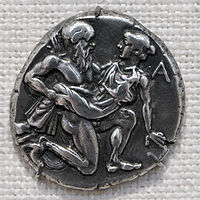The Book of Psalms (Hebrew: תְּהִלִּים or תהילים, Tehillim, "praises"), commonly referred to simply as Psalms or "the Psalms", is the first book of the Ketuvim ("Writings"), the third section of the Hebrew Bible, and a book of the Christian Old Testament.[1] The title is derived from the Greek translation, ψαλμοί psalmoi, meaning "instrumental music" and, by extension, "the words accompanying the music."[2] The book is an anthology of individual psalms, with 150 in the Jewish and Western Christian tradition and more in the Eastern Christian churches.[3][4] Many of the psalms are linked to the name of King David, although his authorship is not accepted by some modern Bible scholars.[4]
---------------------------------------------------------------------------------------------------------------
The Book of Ezekiel is the third of the Major Prophets in the Tanakh and one of the major prophetic books in the Old Testament, following Isaiah and Jeremiah.[1] According to the book itself, it records seven visions of the prophet Ezekiel, exiled in Babylon, during the 22 years 593-571 BCE, although it is the product of a long and complex history and does not necessarily preserve the very words of the prophet.[2] The visions, and the book, are structured around three themes: (1) Judgment on Israel (chapters 1–24); (2) Judgment on the nations (chapters 25–32); and (3) Future blessings for Israel (chapters 33–48).[3] Its themes include the concepts of the presence of God, purity, Israel as a divine community, and individual responsibility to God. Its later influence has included the development of mystical and apocalyptic traditions in Second Temple and rabbinic Judaism and Christianity.
-------------------------------------------------------------------------------------------------------------
The Book of Daniel is a biblical apocalypse, combining a prophecy of history with an eschatology (the study of last things) which is both cosmic in scope and political in its focus.[1] In more mundane language, it is "an account of the activities and visions of Daniel, a noble Jew exiled at Babylon."[2] In the Hebrew Bible it is found in the Ketuvim (writings), while in Christian Bibles it is grouped with the Major Prophets.[3] Its message is that just as the God of Israel saved Daniel and his friends from their enemies, so he would save all of Israel in their present oppression.[4]
The book divides into two parts, a set of six court tales in chapters 1–6 followed by four apocalyptic visions in chapters 7–12.[5] The Apocrypha contains three additional stories, the Song of the Three Holy Children, Susanna, and Bel and the Dragon[6]
Traditionally ascribed to Daniel himself, modern scholarly consensus considers the book pseudonymous, the stories of the first half legendary in origin, and the visions of the second the product of anonymous authors in the Maccabean period (2nd century BC).[5] Its influence has resonated through later ages, from the Dead Sea Scrolls community and the authors of the gospels and Revelation, to various movements from the 2nd century to the Protestant Reformation and modern millennialist movements – on whom it continues to have a profound influence.[7]





